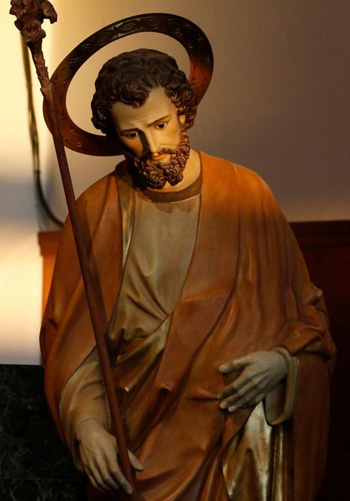
A statue of St. Joseph is seen in Rome. An angel “appeared to Joseph in a dream and said, ‘Rise, take the child and his mother, flee to Egypt, and stay there until I tell you'” (Mt 2:13). Was this a mystical experience? The Gospel’s assurance is that Joseph experienced an intimate connection between his family and God. (CNS photo/Paul Haring)
Are you a mystic? It is an odd-sounding question, isn’t it?
We contemporary Christians — heirs of an elevated, rarified notion of Christian mysticism — tend to retreat from the whole idea.
Recently, however, Pope Francis struck a different tone in describing mystics. The mystic simply is someone who “experiences the intimate connection between God and all beings,” said his 2015 encyclical on the environment, “Laudato Si’.”
Notice how he accents the possibility of experiencing God. Mystics are confident that God interacts with them and others.
Many believers report that they experience God’s presence. The range of possible ways to experience God is broad. There might be a sense that God quieted one’s anxiety. Or perhaps the awareness develops that Christ is present in someone else, whose words are inspiring or whose needs are great.
In biblical times, believers surely were less shy about mentioning God’s presence in their lives than we are today. Had they heard Pope Francis’ description of a mystic, some might have said, “I guess I am a mystic.”
Wouldn’t someone profoundly shaped by Scripture be far less likely to imagine that God is absent than to believe that God is working quietly and actively within human lives?
Psalm 139 asks God, “From your presence, where can I flee?”
The answer to heartfelt prayer, then as now, was evidence that God could be experienced. “On the day I cried out, you answered; you strengthened my Spirit,” Psalm 138 proclaims.
[hotblock]
I doubt it was surprising in biblical times to hear in the Gospel of Matthew that God entered St. Joseph’s dreams in order to guide the Holy Family to safety in the face of King Herod’s threat to newborn boys. “The angel of the Lord appeared to Joseph in a dream and said, ‘Rise, take the child and his mother, flee to Egypt, and stay there until I tell you'” (Mt 2:13).
Was this a mystical experience? The Gospel’s assurance is that Joseph experienced an intimate connection between his family and God.
Pope Francis said in a 2017 homily about Joseph that “when we dream great things, beautiful things, we draw close to … the things that God dreams for us.”
One great challenge for Christians who experience God is to enable others, humbly and in welcome ways, to experience God too.
Today, the experience of God may be hampered by the difficulty of recognizing the sacred in the ordinary. Holy Cross Father Tom Hosinski, theologian and professor emeritus at the University of Portland in Oregon, commented on this challenge in a 2017 edition of Portland magazine.
“It is because we take our ordinary daily lives for granted that we so often fail to remember how sacred our ordinary daily lives are, how filled with the divine,” he said.
In “Laudato Si'” Pope Francis encouraged believers to search out the “mystical meaning” to be found “in a leaf, in a mountain trail, in a dewdrop, in a poor person’s face.”
The ideal, he advised, is “to discover God in all things.”
***
Gibson served on Catholic News Service’s editorial staff for 37 years.
PREVIOUS: From the Middle Ages to modern times, mystics call us to intimacy with God
NEXT: Slow down and don’t swerve into life’s oncoming traffic



Share this story